

It also able to influence an individual if they would like to improve their behaviour or to repeat that specific behaviour. It is therefore a learning by consequence
B.F Skinner believed that individuals has the ability to predict and control behaviour and if the individuals could make control the environment, the individuals would be able to control the behaviours as well.
In Operant Conditioning, there is the presence of reinforcement and punishment which is highly applicable for parents to use this theory to control and enhance the conduct of their teenage children.
Negative Reinforcement. Positive Reinforcement. Negative Reinforcement vs Positive Reinforcement. Parenting A Teen Through Positive Reinforcement - Back On Track. Most parents can agree: the teenage years can be rough!
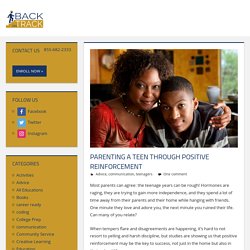
Hormones are raging, they are trying to gain more independence, and they spend a lot of time away from their parents and their home while hanging with friends. One minute they love and adore you, the next minute you ruined their life. Can many of you relate? Why Negative Reinforcement Works Better as Your Child Grows into A Teen. If you are someone who has always loved the freedom of “no strings attached”, the idea of marrying and having kids could be quite underwhelming.
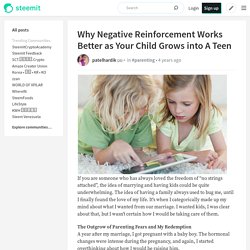
The idea of having a family always used to bug me, until I finally found the love of my life. It's when I categorically made up my mind about what I wanted from our marriage. I wanted kids, I was clear about that, but I wasn’t certain how I would be taking care of them. The Outgrow of Parenting Fears and My Redemption A year after my marriage, I got pregnant with a baby boy. Parenting Information. Behaviors are more likely to happen again when followed by a positive consequence like a reward.
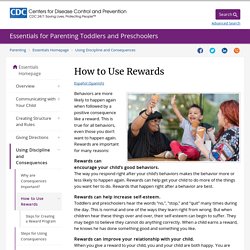
This is true for all behaviors, even those you don’t want to happen again. Rewards are important for many reasons: Rewards can encourage your child’s good behaviors.The way you respond right after your child’s behaviors makes the behavior more or less likely to happen again. Rewards can help get your child to do more of the things you want her to do. Rewards that happen right after a behavior are best. What is Punishment? Positive Punishment. Negative Punishment. Positive Punishment vs Negative Punishment. Positive Punishment: What It Is, Benefits, and Examples. Positive punishment is a form of behavior modification.
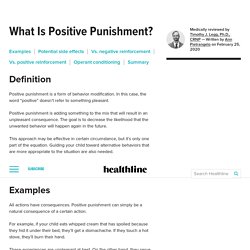
In this case, the word “positive” doesn’t refer to something pleasant. Positive punishment is adding something to the mix that will result in an unpleasant consequence. The goal is to decrease the likelihood that the unwanted behavior will happen again in the future. This approach may be effective in certain circumstance, but it’s only one part of the equation. Guiding your child toward alternative behaviors that are more appropriate to the situation are also needed. What is Negative Punishment (Examples and Effectiveness) In this article, we will review negative punishment, its definition, examples, and drawbacks.

American psychologist B.F. Skinner developed the theory of operant conditioning, which stated that a person or animal’s behavior could be increased or decreased by adding or removing appropriate stimuli after the behavior is exhibited. 7 Ways to Make Grounding Your Teen Effective Discipline. Parents often use grounding as a consequence when teenagers violate a basic family rule—like their curfew.
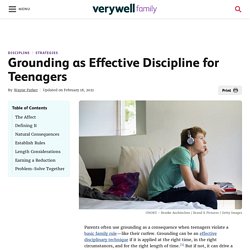
Grounding can be an effective disciplinary technique if it is applied at the right time, in the right circumstances, and for the right length of time.1 But if not, it can drive a wedge between parents and teenagers. Learn how to apply grounding as a consequence. How Grounding Affects Teens Interaction with their peer group is a strong priority for teens. Branching out from family and connecting with others of their own age is an important part of the transition to adulthood and independence. Appropriate Consequences for a Teen’s Bad Behavior. When a teen breaks the rules or behaves poorly, parents must step in and ensure that there is a consequence.

It’s important to understand that punishment is not the goal in a parent’s discipline, but rather providing a lesson. Learning from your mistakes is often life’s best method for growing and improving. Nurturing Teenagers' Behaviour. Rewarding behavior is key to parenting teens, study suggests. Parenting is hard, and parenting teens brings about an entirely new set of challenges, from keeping their rooms clean to getting them home before curfew.

But, a new study suggests parents who want their teenagers to keep their grades up could have better success if they focus more on rewarding good behavior and less on threatening to punish the bad. According to the report, published in PLOS Computational Biology, British researchers have found that adolescents focus well on positive incentives, but have difficulty staying motivated to avoid penalties. The study shows that teens and adults learn in different ways, according to the study’s lead author Stefano Palminteri, a researcher with the Institute of Cognitive Neuroscience at University College London. It suggests that “in some cases positive feedback may have more of an effect than negative feedback on learning” in adolescents.
“Rewards give them something they want to think about,” Allen said. Reinforcement or Punishment?